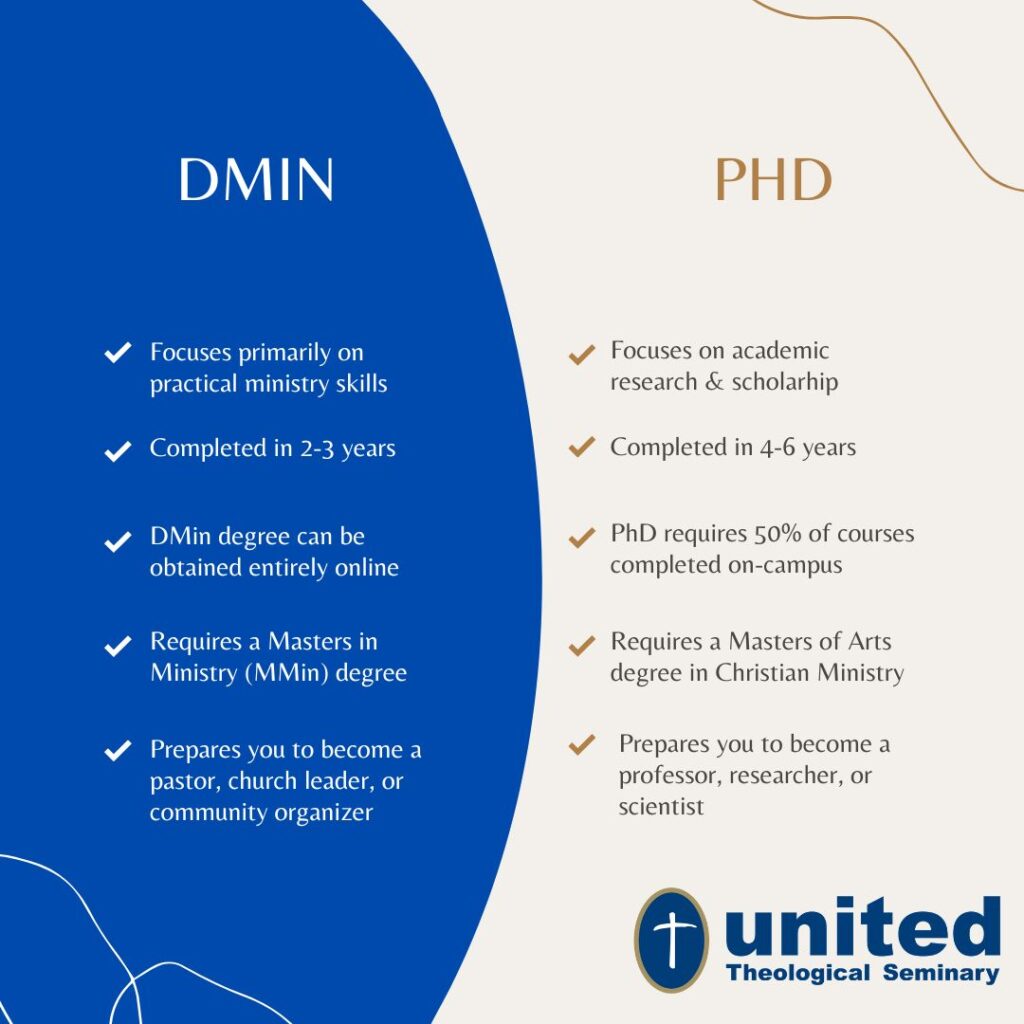Deciding to pursue a DMin or PhD can be difficult. Both degrees offer many opportunities for career growth, but they also require a lot of time and effort. So, should you get a DMin or PhD? This article will discuss the main differences between both degrees and help you decide which one is right for you.
WHAT ARE A DMIN AND PHD DEGREE?
In short:
- The Doctor of Ministry (DMin) refers to an advanced professional degree. The Doctor of Ministry degree is designed for pastors and religious leaders who want to strengthen their expertise in a specific area of ministry for applied leadership in their churches and communities.
- The Doctor of Philosophy (PhD) is an advanced academic degree that focuses on research and scholarship to expand the academic community’s understanding in a particular field of study. So, what are the key differences between a DMin degree and a PhD?
DIFFERENCES BETWEEN A DMIN AND A PHD DEGREE:

The main difference is that the DMin degree focuses on practical ministry skills, while the PhD degree focuses on academic research and scholarship.
The other significant difference is that the DMin degree is typically completed in three years, while the PhD degree can take four to six years.
Both degrees require a lot of time and effort, but the DMin degree is more focused on practical skills and can be completed in a shorter amount of time.
It is also important to note in order for a PhD degree, you must be on-campus for half of your required courses.
For DMin, you have the option to take the entire degree online. This can allow you to serve in ministry in your community while you’re receiving your degree.
THE ADVANTAGES OF DMIN DEGREE
The Doctor of Ministry degree offers many opportunities for career growth. It can prepare you for advancement in various ministry-related careers, such as pastor, church leader, or community organizer.
DMin degree is an excellent way to further your education and knowledge in the ministry field. It helps you develop practical skills essential for effective ministry. These skills include preaching, teaching, and leadership development.
At United Theological Seminary, you will learn from faculty mentors who are experienced religious practitioners in your area of ministry. You will also be placed in a cohort of peers focused on similar ministry goals.
THE ADVANTAGES OF A PHD
The Doctor of Philosophy degree offers many opportunities for career growth. It can prepare you for various academic and research-related careers, such as professor, researcher, or scientist.
The PhD degree also helps you develop advanced research skills essential for successful academia. These skills include critical thinking, analysis, and problem-solving.
It also allows you to pursue your research interests and contribute new knowledge to your field of study.
WHICH DEGREE IS RIGHT FOR YOU?
Now that you know the differences between a DMin or PhD, you may ask yourself which degree suits you.
The answer depends on your personal goals and interests. Both degrees offer many opportunities for career growth, but the DMin degree is more focused on practical skills and can be completed in a shorter amount of time compared to a PhD.
A DMin is an excellent option for those who want to pursue a career in ministry. Do you have an undergraduate degree in theology or a related field? Are you looking for ways to continue your education and grow in your ministry?
If so, then you should consider pursuing a DMin degree. A DMin offers a lot of practical training and prepares you for many different ministry positions.
A PhD is perfect for those who want to become professors or researchers. It provides a lot of theoretical training and helps you develop advanced research skills.
HOW DO I DECIDE WHICH DEGREE IS RIGHT FOR ME?
What are your goals and interests? Are you looking for ways to continue your education and grow in your field of study?
You may want to consider the following factors:
PURPOSE OF DEGREE
What are you hoping to achieve with your degree? You may want to consider the purpose of the degree before making a decision. For example, if you’re interested in pursuing or continuing a career in ministry, then a DMin degree may be right for you.
If you’re interested in becoming a professor or researcher, then a PhD may be right for you.
FIELD OF STUDY
What is your undergraduate degree in? If you have an undergraduate degree in theology or a related field, then the DMin degree may be right for you. If you’re interested in pursuing a career in academia, then a PhD may be right for you.
TIME COMMITMENT
How much time are you willing to commit to your studies? The DMin degree can be completed in a shorter time than the PhD.
COST
How much money are you willing to spend on your education? The PhD degree can be more expensive to pursue than the DMin degree.
SCOPE OF THE PROGRAM
What type of training are you interested in receiving? The PhD degree offers more theoretical training than the DMin degree. The DMin degree is more focused on practical skills.
LEVEL OF RIGOR
Is the program academically rigorous enough for you? Both the DMin and PhD degrees offer a high level of academic rigor, so you should be prepared for the commitment that will be required
After considering these factors, you should decide which degree is right for you.
Consult with an admissions counselor at the schools you are considering, or reach out to a trusted mentor who has completed a similar degree as you decide which one is right for you.
FINAL THOUGHTS
Both the DMin and PhD degrees offer many opportunities for career and spiritual growth. Hopefully, this article helped inform you of the similarities, differences, and opportunities that these two degrees possess.
If you are considering either a DMin degree or any other type of degree in divinity, ministry, or theological studies, we offer an array of different degree programs as well as online options. Please be sure to check out our degrees program page here: united.edu/degree-programs-overview/
If you have any further questions or would like assistance with your application process, please feel free to reach out to our Admissions office, and we will be pleased to assist you.
Click here to learn more on how to apply.


